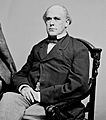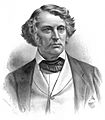Radical Republican facts for kids
Quick facts for kids
Radical Republicans
|
|
|---|---|
| Leader(s) | Sen. John C. Frémont (CA) Sen. Charles Sumner (MA) Rep. Thaddeus Stevens (PA) Pres. Ulysses S. Grant (OH) |
| Founded | 1854 |
| Dissolved | 1877 |
| Merger of | Ex-Free Soils |
| Succeeded by | Stalwarts |
| Ideology | Radicalism Abolitionism Reconstructionism |
| National affiliation | Republican Party |
The Radical Republicans were a group of American politicians. They were part of the Republican Party. This group existed from 1854 until 1877. They called themselves "radicals" because they wanted big changes.
During the Civil War, they were often against the Moderate Republicans. Abraham Lincoln led the Moderate Republicans. The Radical Republicans worried that if politicians from the North and South joined forces again, the Republican Party would lose its power.
How the Republican Party Started
The Republican Party began in 1854. This happened because of the Kansas–Nebraska Act. This new law caused the Whig Party to split. Northern Whigs then joined with members of the Free Soil Party. They also teamed up with the Know-Nothing Party. Together, they formed the Republican Party.
Between 1854 and 1861, the Republican Party had many different groups. It included former Whigs, Democrats who were against slavery, and Abolitionists. By the start of the Civil War, there were three main groups. These were conservatives, moderates, and radicals.
What Radical Republicans Believed
Republicans generally did not support slavery. However, many did not want to give African Americans equal rights. This was true even after slavery ended.
Radical Republicans had different ideas. They strongly believed that African Americans should have equal rights. They wanted them to have the same chances as white people. They also wanted to punish the leaders of the Confederate States of America. They felt these leaders should be held responsible for their part in the Civil War.
Images for kids
-
U.S. Rep. Thaddeus Stevens
-
Salmon P. Chase, who was Lincoln's Secretary of the Treasury
-
Henry Winter Davis, who opposed Lincoln's plans for Reconstruction
-
Edwin M. Stanton, Lincoln's Secretary of War
-
U.S. Senator Charles Sumner
 | Selma Burke |
 | Pauline Powell Burns |
 | Frederick J. Brown |
 | Robert Blackburn |







